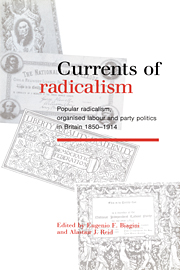 Currents of Radicalism
Currents of Radicalism Book contents
- Frontmatter
- Contents
- Notes on contributors
- Preface
- 1 Currents of radicalism, 1850–1914
- Part I Continuities in popular radicalism
- Part II The Liberal party and the people
- Part III Radicals, Liberals, and the Labour party
- 9 Labour and parliament: the Lib.-Labs. as the first working-class MPs, 1885–1906
- 10 Old Unionism reconsidered: the radicalism of Robert Knight, 1870–1900
- 11 Labour and local politics: radicalism, democracy and social reform, 1880–1914
- 12 Ideological debate in Edwardian Labour politics: radicalism, Revisionism and socialism
- Index
11 - Labour and local politics: radicalism, democracy and social reform, 1880–1914
from Part III - Radicals, Liberals, and the Labour party
Published online by Cambridge University Press: 07 September 2010
- Frontmatter
- Contents
- Notes on contributors
- Preface
- 1 Currents of radicalism, 1850–1914
- Part I Continuities in popular radicalism
- Part II The Liberal party and the people
- Part III Radicals, Liberals, and the Labour party
- 9 Labour and parliament: the Lib.-Labs. as the first working-class MPs, 1885–1906
- 10 Old Unionism reconsidered: the radicalism of Robert Knight, 1870–1900
- 11 Labour and local politics: radicalism, democracy and social reform, 1880–1914
- 12 Ideological debate in Edwardian Labour politics: radicalism, Revisionism and socialism
- Index
Summary
This chapter seeks to elaborate on the final comment of Alastair Reid's contribution: ‘The Labour party … should be seen neither as an entirely new departure in working-class politics nor as the demise of socialism in the deadly embrace of ‘labourist’ Old Unionism, but rather as a dynamic recomposition of popular radicalism in adaptation to a new political environment.’ It aims to examine this process of ‘recomposition’ firstly through a survey of aspects of municipal politics between the 1880s and 1914. The proliferating range of local elections – for town councils as more towns acquired incorporation, county councils from 1889, vestries, boards of poor law guardians, school boards (until 1904), parish, urban district and rural district councils from 1894, London boroughs from 1900 – and their frequency, offered opportunities for political parties to build up and to exercise party machinery. Their cheapness also enabled new groups to enter politics. Local government had powers to transform essential features of everyday life – or death – which were increasing from the 1870s (e.g. in the important area of sanitation) and it offered more immediate prospects of democratic control of policy making and administration than did central government. There was every reason for radical critics of late Victorian society to take participation in local government extremely seriously. It was one of the paths whereby social reform became central to the politics of the quarter century before 1914 and brought a qualitative change to it.
- Type
- Chapter
- Information
- Currents of RadicalismPopular Radicalism, Organised Labour and Party Politics in Britain, 1850–1914, pp. 244 - 270Publisher: Cambridge University PressPrint publication year: 1991
- 5
- Cited by
